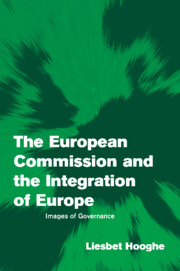Book contents
- Frontmatter
- Contents
- List of figures
- List of tables
- Preface
- Prologue
- 1 Preference formation in the European Commission
- 2 Men (and women) at Europe's helm
- 3 Images of Europe
- 4 Beyond supranational interest
- 5 Capitalism against capitalism
- 6 Principal or agent
- 7 Accommodating national diversity
- 8 Conclusion
- Appendix I Statistics
- Appendix II Description of independent variables
- Appendix III Survey material
- References
- Index
Prologue
Published online by Cambridge University Press: 22 September 2009
- Frontmatter
- Contents
- List of figures
- List of tables
- Preface
- Prologue
- 1 Preference formation in the European Commission
- 2 Men (and women) at Europe's helm
- 3 Images of Europe
- 4 Beyond supranational interest
- 5 Capitalism against capitalism
- 6 Principal or agent
- 7 Accommodating national diversity
- 8 Conclusion
- Appendix I Statistics
- Appendix II Description of independent variables
- Appendix III Survey material
- References
- Index
Summary
European integration studies have found it difficult to produce cumulative research. Some may argue that cumulative knowledge is always hard to come by in area studies. Yet Europe has traditionally been a rewarding laboratory for scholars in search of answers to basic questions. Various subfields in political science – political parties, mass public opinion, welfare regimes, systems of industrial relations, public administration, public policy, social movements, or value change – draw empirically primarily from the “area of Europe”.
Cumulative research in European integration studies has been an uphill struggle for several reasons. One is that European integration has often been perceived as a unique case. Despite Giovanni Sartori's warning that “he who knows only one country knows none” (Sartori 1991), many EU scholars have been reluctant to consider the European Union as one case within an n larger than one. Ironically, the study of regional integration in Europe began as a distinctly comparative-historical enterprise. European integration occupied a secondary place to international integration in David Mitrany's functionalist theory (Mitrany 1966). Ernie Haas (1958, 1960, 1964) wrote about various forms of regional integration that were emerging in postwar Europe, including the Nordic Council, the Council of Europe, the North Atlantic Treaty Organisation (NATO), the Western European Union, and the predecessors of the European Community (EC), such as the European Coal and Steel Community. He also analyzed global forms of integration, such as the International Labour Organization, a study that had a strong influence on his formulation of neofunctionalism (Haas 1964).
- Type
- Chapter
- Information
- The European Commission and the Integration of EuropeImages of Governance, pp. 1 - 5Publisher: Cambridge University PressPrint publication year: 2002



